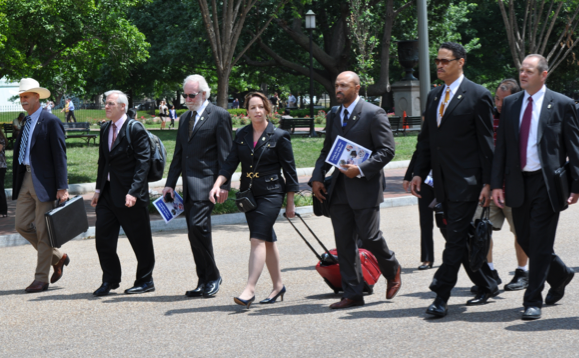For Immediate Release: May 23, 2011
Medical Marijuana Advocates Sue Federal Government Over Rescheduling Delay/Writ filed today in DC Circuit Court for unreasonable delay in answering 9-year-old petition
*Washington, DC* -- A Coalition of advocacy groups and patients filed suit in the DC Circuit Court today to compel the Obama administration to answer a 9-year-old petition to reclassify medical marijuana. The Coalition for Rescheduling Cannabis (CRC) has never received an answer to its 2002 petition, despite a formal recommendation in 2006 from the Department of Health and Human Services (HHS) to the Drug Enforcement Administration (DEA), the final arbiter in the rescheduling process. As recently as July 2010, the DEA issued a 54-page "Position on Marijuana," but failed to even mention the pending CRC petition. Plaintiffs in the case include the CRC, Americans for Safe Access (ASA), Patients Out of Time, as well as individually named patients, one of whom is listed on the CRC petition but died in 2005.
"The federal government's strategy has been delay, delay, delay," said Joe Elford, Chief Counsel of ASA and lead counsel on the writ. "It is far past time for the government to answer our rescheduling petition, but unfortunately we've been forced to go to court in order to get resolution." The writ of mandamus filed today accuses the government of unreasonable delay in violation of the Administrative Procedures Act. A previous cannabis (marijuana) rescheduling petition filed in 1972 went unanswered for 22 years before being denied.
The writ argues that cannabis is not a dangerous drug and that ample evidence of its therapeutic value exists based on scientific studies in the US and around the world. "Despite numerous peer-reviewed scientific studies establishing that marijuana is effective" in treating numerous medical conditions, the government "continues to deprive seriously ill persons of this needed, and often life-saving therapy by maintaining marijuana as a Schedule I substance." The writ calls out the government for unlawfully failing to answer the petition despite an Inter-Agency Advisory issued by the Food and Drug Administration in 2006 and "almost five years after receiving a 41-page memorandum from HHS stating its scientific evaluation and recommendations."
The two largest physician groups in the country -- the American Medical Association <http://AmericansForSafeAccess.org/downloads/AMA_Report.pdf> and the American College of Physicians <http://www.acponline.org/advocacy/where_we_stand/other_issues/medmarijuana.pdf> -- have both called on the federal government to review marijuana's status as a Schedule I substance with no accepted medical use and a high potential for abuse. The National Cancer Institute, a part of the National Institutes of Health, added cannabis to its website earlier this year as a Complementary Alternative Medicine (CAM) and recognized that, "/Cannabis/ has been used for medicinal purposes for thousands of years prior to its current status as an illegal substance."
Medical marijuana has now been decriminalized in 16 states and the District of Columbia, and has an 80% approval rating among Americans according to several polls. In a 1988 ruling on a prior rescheduling petition, the DEA's own Administrative Law Judge Francis Young recommended in favor of reclassification stating that, "Marijuana, in its natural form, is one of the safest therapeutically active substances known to man."
A formal rejection of the CRC petition would enable the group to challenge in court the government's assertion that marijuana has no medical value. "Adhering to outdated public policy that ignores science has created a war zone for doctors and their patients who are seeking use cannabis therapeutics," said Steph Sherer, Executive Director of ASA and a plaintiff in the writ. Jon Gettman, who filed the rescheduling petition on behalf of the CRC added that, "The Obama Administration's refusal to act on this petition is an irresponsible stalling tactic."
A synthetic form of THC, the main chemical ingredient in the cannabis plant, is currently classified Schedule III for its use in a prescribed pill trademarked as Marinol®. The pill goes off-patent this year and companies vying to sell generic versions are petitioning the government to also reclassify the more economical, naturally-derived THC (from the plant) to Schedule III. The rescheduling process involves federal agencies such as the National Institute on Drug Abuse, HHS, and DEA. On average, it takes 6 months from HHS review to final action, whereas it's been nearly 5 years since HHS issued its recommendation on the CRC petition, more than twice as long as any other rescheduling petition reviewed since 2002.
Further information:
Writ filed today: http://AmericansForSafeAccess.org/downloads/CRC_Writ.pdf
ASA backgrounder on rescheduling:
http://AmericansForSafeAccess.org/downloads/Rescheduling_Backgrounder.pdf
CRC rescheduling petition:
http://www.drugscience.org/PDF/Petition_Final_2002.pdf
2006 HHS recommendation:
http://AmericansForSafeAccess.org/downloads/HHS_Rescheduling_Recommendation.pdf
2010 DEA Position on Marijuana:
http://www.justice.gov/dea/marijuana_position_july10.pdf
# # #




 Tommy Chong
Tommy Chong

